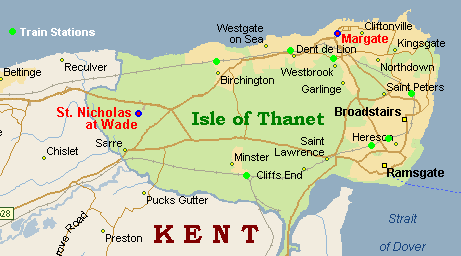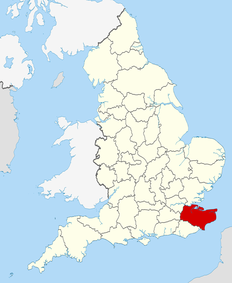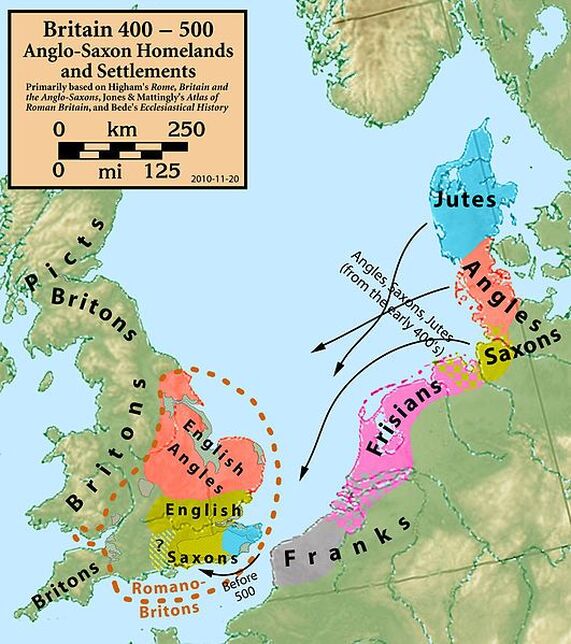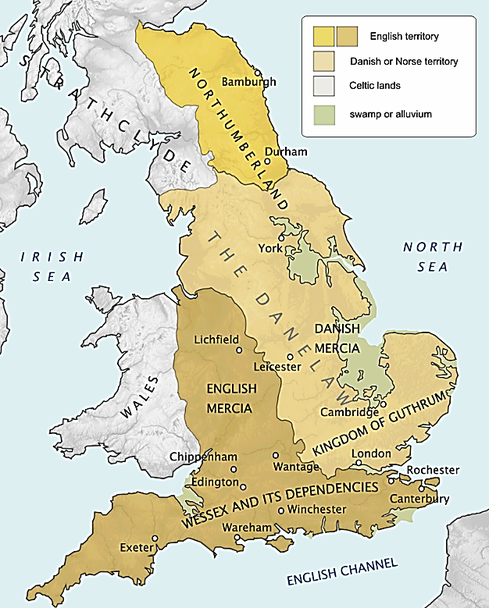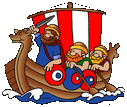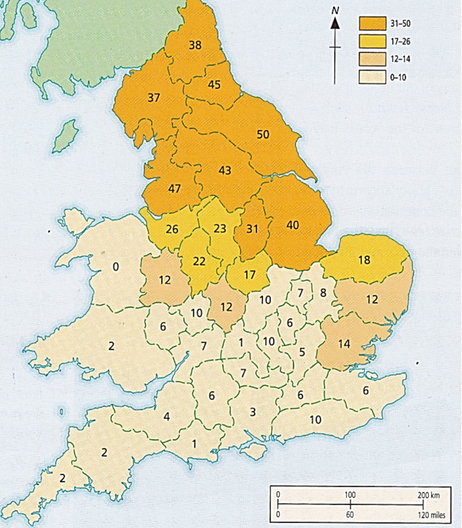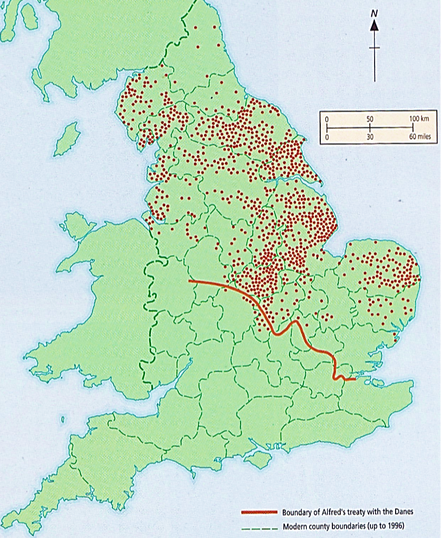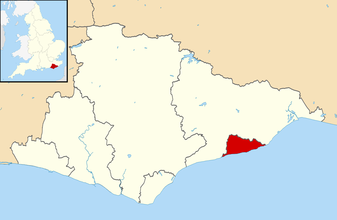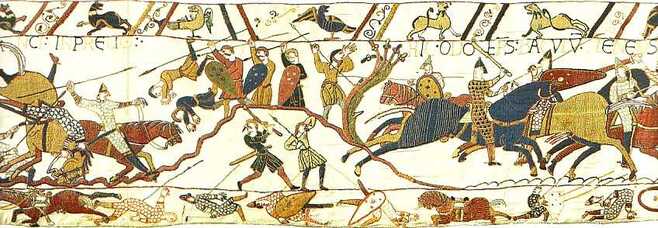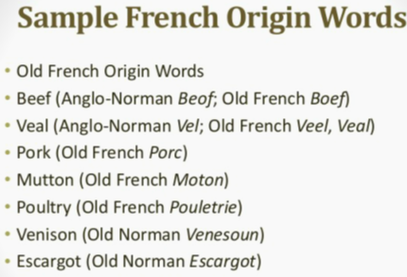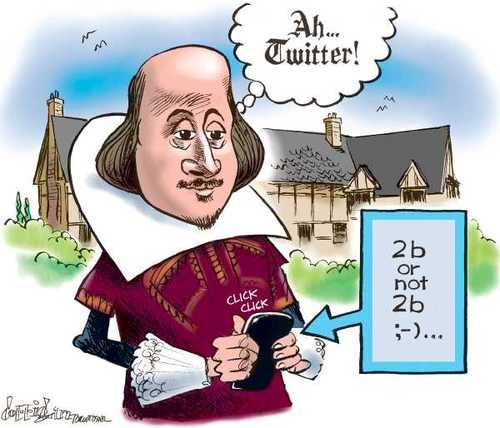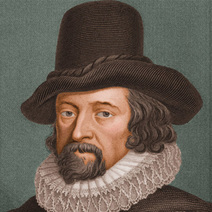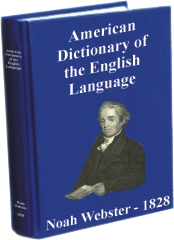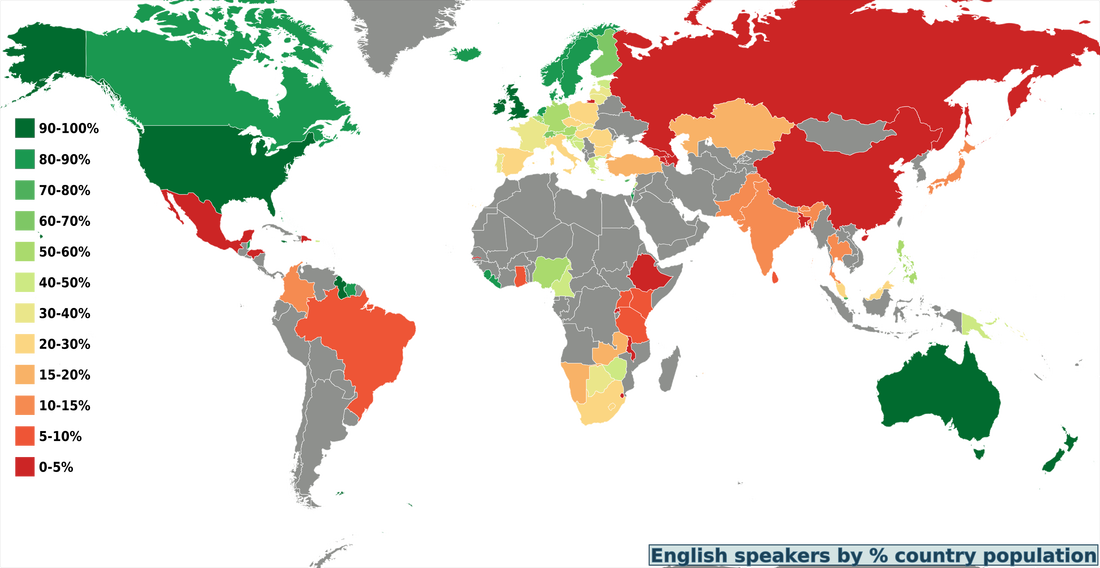The Story of English:
How an Obscure Dialect Became the World's Most-Spoken Language
|
Programme du chapitre
1- The Anglo-Saxon, The jutes and The Vikings. 2- The Norman Conquest. 3- The origins and evolution of the English language. 4- Shakespeare's influence and legacy. 5- How English became the world's most-spoken language. 6- The influence of American TV-series. |
Les objectifs de ce chapitre
|
I- The Anglo-Saxon, The Jutes and The Vikings.
|
The end of the Roman Era ushered a period of upheaval for the native Celtic tribes of Britain. They were left to themselves and faced numerous attacks and invasion attempts. They hired mercenaries to protect them from invaders - many of whom became a threat themselves - attracted by the rich farmland of the south and east of England.
|
In 449 the Celtic King Vortigern send a request for help to a Germanic tribe called the Jutes (from Jutland which would now be part of modern-day Denmark.) The Jutes were employed as mercenaries to serve in the south and east of Britain. They successfully repelled the Scots and the Picts. As a reward for their bravery and in return for their services, Vortigen decided to give them the Isles of Thanet in Kent to settle in. The Isle of Thanet /ˈθænɪt/ lies at the most easterly point of Kent, England. While in the past it was separated from the mainland by the 600-metre Wantsum Channel, it is no longer an island.
|
Vortigen believed that this gift would ensure their loyalty in case of further invasions from the north, as they would be protecting part of their own country (the Isle of Thanet being part of Britain). The Jutes were quite taken with their new lands and so more and more Germanic tribes began to arrive from the continent, including the Angles and the Saxons The number of Germanic settlers increased and many bloody battles took place between 457 and 473 where the Germanic tribes massacred the Celts and forced them to flee their land. This process of domination and the colonization of Britain by the Germanic tribes continued for about a century and the different native Celtic tribes were forced further and further to Cornwall, Wales and Cumbria and across the sea to Britany taking their language and what remained of their civilization with them. This led to the near extinction of the Celtic language in many parts of Britain. However, it also led to the birth of English. |
The Anglo-Saxons took control of most of Britain. However, they never conquered Scotland, Wales or Cornwall. The historian Bede, who lived in the 700s, wrote that Angles settled in East Anglia, the East Midlands and further north in Northumbria. Saxons moved in to Sussex (named after the 'South Saxons'), Essex (East Saxons), Middlesex (Middle Saxons) and Wessex (West Saxons). Jutes settled mainly in Kent, Hampshire and the Isle of Wight.
Place names give clues to where the new 'English' lived. A place-name ending in -ham, for instance, shows it was once a Saxon settlement.
- Ham in Anglo-Saxon English meant 'village'.
- Wic or wich in a place name comes from an Old English word ‘wich’ meaning 'farm' or 'village'. Examples: Ipswich, Dulwich, Droitwich.
The Vikings & The Influence of Old Norse
|
The Vikings spoke a language we identify as Old Norse which showed similarities with Old English as they were both from the northern Germanic language tree. Due to the many similarities it must have been possible for the two races to understand each other. It is estimated that about 1,400 Old Norse loanwords entered the English language during the period. Here are some examples:
|
Words related to the Vikings’ barbarous behaviour:
|
Other everyday words:
|
The personal pronouns :
they, their, them |
The all-in-all contribution of words from Germanic origins (Anglo-Saxon, Old Norse etc.) amounts to about 23% of the current English vocabulary.
The Old Norse influence on surnames and place names today
|
SCANDINAVIAN PLACE NAME
Scandinavian parish names in england, related to the boundary line of the Danelaw.
There are over 1,500 such place names in England. Over 600 words end in –by, the Scandinavian word for ‘farm’ or ‘town’ – Derby, Grimsby, Rugby, etc… |
SCANDINAVIAN PERSONAL NAMES
The distribution of English family names ending in –son, such as Davidson, Jackson, and Henderson. The figures give the number of different surnames which are thought to have come from each county. The Scandinavian influence in the north and east is very clear, especially in Yorkshire, and north Lincolnshire, where over 60 per cent of personal names in early Middle English records show Scandinavian influence. |
Doublets - 'the survival of the fittest...'
With two cultures (Vikings and Anglo Saxons) in such close contact for a long time, a large number of duplicate words appeared.
Both Old Norse and Old English provided ways of describing the same objects or situations. In some cases, one of the doublets fell out of use. In other cases both words have been retained but they develop a different meaning.
SICK: Old English sēoc ‘affected by illness’, of Germanic origin; related to Dutch ziek and German siech.
Middle English (also in the plural denoting clouds), from Old Norse ský ‘cloud’. The verb dates from the early 19th cent.
In many cases, one form has become standard, and the other kept in a regional dialect.
Both Old Norse and Old English provided ways of describing the same objects or situations. In some cases, one of the doublets fell out of use. In other cases both words have been retained but they develop a different meaning.
- SHIRT / SKIRT
- ILL / SICK
SICK: Old English sēoc ‘affected by illness’, of Germanic origin; related to Dutch ziek and German siech.
- SKY / HEAVEN
Middle English (also in the plural denoting clouds), from Old Norse ský ‘cloud’. The verb dates from the early 19th cent.
In many cases, one form has become standard, and the other kept in a regional dialect.
- KIRK (Scotland) / CHURCH
- NAY (Scotland) / NO
Textes à lire pour en savoir plus
|
| ||||||||||||
Les Vikings en France et leur influence sur la langue française
| Les Vikings en France - CARTE.png | |
| File Size: | 1481 kb |
| File Type: | png |
| Les mots Vikings en français.pdf | |
| File Size: | 1086 kb |
| File Type: | |
II- The Norman Conquest
The Battle of Hastings
|
William of Normandy defeated the English army in Hastings (actually a little further north of the actual town – 10 km northwest of Hastings) in 1066. He then marched to London and was crowned on Christmas Day in 1066. The coronation took place in Westminster Abbey.
Around a quarter of the land in England was owned by the crown and William set about installing Normans into position of power and influence across all areas of English life. Over the next few years his lieutenants in the county imposed their might with castles which dominated their surroundings. |
William the Conqueror saw English as the language of peasants and even if English was so despised by the Normans, it was still used in rural areas by peasant serfs and also for some church services.
Norman French
The variety of French the Normans spoke was not the speech of Paris, but a rural dialect, and its divergence from standard French became even more pronounced when it took root in England – so much so that historians refer to it not as French, but as Anglo-Norman.
After the Norman conquest, no king of England spoke English for the next 300 years. It was not until 1399, with the accession of Henry IV and the adoption of English as the language of record within Government, that England had a ruler whose mother tongue was English. One by one English earls and bishops were replaced by Normans. French-speaking craftsmen, designers, cooks, scholars, and scribes were brought to Britain.Norman society had two tiers: The French-speaking aristocracy and the English-speaking peasantry. Not surprisingly, the linguistic influence of the Normans tended to focus on matters of court government, fashion, and high living. Meanwhile, the English peasant continued to eat, drink, work, sleep, and play in English.
After the Norman conquest, no king of England spoke English for the next 300 years. It was not until 1399, with the accession of Henry IV and the adoption of English as the language of record within Government, that England had a ruler whose mother tongue was English. One by one English earls and bishops were replaced by Normans. French-speaking craftsmen, designers, cooks, scholars, and scribes were brought to Britain.Norman society had two tiers: The French-speaking aristocracy and the English-speaking peasantry. Not surprisingly, the linguistic influence of the Normans tended to focus on matters of court government, fashion, and high living. Meanwhile, the English peasant continued to eat, drink, work, sleep, and play in English.
|
|
Norman French, like Germanic tongues before it, made a lasting impact on English vocabulary. Of the 10,000 words adopted from the Norman French, some three-quarters are still in use – among them justice, jury, felony, traitor, petty, damage, prison, marriage, sovereign, parliament, govern, prince, duke, baron. In fact, nearly all our wo8rds relating to jurisprudence and government are of French origin.
The Decline of French
The decline of French occurred in the latter half of the 14th Century. Many factors are put forward to explain this decline of the language.
- England was engaged in the Hundred Years’ War with France.
- The Black Death had arrived and killed 30 percent of the population of England. It challenged the authority of the Church and Government.
Henry IV & Henry V thought they needed a common language to unite English people. They changed the language of Parliament from French to English. His reign marks the appearance of Chancery Standard English as well as the adoption of English as the language of record within Government. He was the first king to use English in his personal correspondence since the Norman conquest, which had occurred 350 years earlier.
From that moment on, England entered a period where English kings spoke English and English was taught in schools. During the reign of Henry IV and Henry V, written English began to be used for business matters, laws and literature. Towards the end of the 15th Century, English began to stabilize. The era of Modern English was on its way.
Legacy of Norman French in the English language:
It estimated that about 10,000 Norman French words were incorporated into English between the Conquest and the 15th century. Many of those words are related to officialdom, the law and administration. English also counts many Norman French words related to food and drinks such as ‘ fruit ’, ‘ mustard ’, ‘salmon’, ‘herb’, ‘ceiling’, ‘parlour’, ‘button’.
It estimated that about 10,000 Norman French words were incorporated into English between the Conquest and the 15th century. Many of those words are related to officialdom, the law and administration. English also counts many Norman French words related to food and drinks such as ‘ fruit ’, ‘ mustard ’, ‘salmon’, ‘herb’, ‘ceiling’, ‘parlour’, ‘button’.
Textes à lire pour en savoir plus :
|
|
| ||||||||||||||||||
III- William Shakespeare's Influence on the English Language
Shakespeare was a prolific wordsmith. The Oxford English Dictionary cites over 2,000 words found in Shakespeare’s poetry and plays, which were not written down elsewhere prior to the late sixteenth century. Some words he coined for particular effect or to expand dramatic expression; others were borrowings from other languages. Many common phrases and idioms that we take for granted today or even regard as clichés today can be traced back to Shakespeare’s works.
Hundreds of the everyday words and phrases we use today are attributed to Shakespeare. Some of these are actually borrowings from other sources such as early medieval poetry or passages from the Bible, but they are known to us because of this plays. For example, the well-known phrases ‘It was Greek to me’ and ‘Give the devil his due’ are both derived from Shakespeare plays Julius Caesar and Henry IV.
Hundreds of the everyday words and phrases we use today are attributed to Shakespeare. Some of these are actually borrowings from other sources such as early medieval poetry or passages from the Bible, but they are known to us because of this plays. For example, the well-known phrases ‘It was Greek to me’ and ‘Give the devil his due’ are both derived from Shakespeare plays Julius Caesar and Henry IV.
| |||||||||||||||||||||||||
The Baconian Theory... Did Sir Francis Bacon write Shakespeare's plays?
Sir Francis Bacon (1561-1626) was a leading philosopher, scientific writer, lawyer and politician during the reign of Queen Elizabeth I and James I. Bacon’s work covers a wide range of subjects encompassing politics, law, scientific methodology and questions of ethics.
|
Since the mid-nineteenth century, various writers and scholars have proposed the theory that Shakespeare’s plays were written by Sir Francis Bacon using ‘Shakespeare’ as a pseudonym, or that they were written by a team of writers of which Bacon was the leader. However, there is no evidence at all that Bacon had anything to do with writing for the theatre. The theory was based on perceived correspondences between the philosophical ideas found in Bacon’s writings and the works of Shakespeare. Later, proponents claimed to have found legal and autobiographical allusions and cryptographic ciphers and codes in the plays and poems to buttress the theory. All academic Shakespeare scholars but a few reject the arguments for Bacon authorship, as well as those for all other alternative authors.
|
IV - The Evolution of Words Through Time
There are many words in Modern English which, although similar in the Middle and Early Modern period, have seen their core meaning change in terms of everyday use. Such is the fluidity of the English language, that meanings change rapidly from generation to generation
Girl
In Old English the word ‘girl’ used to mean ‘a child or a young person of either sex’. It was gender neutral but the word ‘girl’ changed to mean ‘a young woman’.
In Old English the word ‘girl’ used to mean ‘a child or a young person of either sex’. It was gender neutral but the word ‘girl’ changed to mean ‘a young woman’.
Man
The word ‘man’ was originally gender neutral as well, meaning more or less the same as the modern day word “person”. It wasn’t until about a thousand years ago that the word “man” started to refer to a male and it wasn’t until the late 20th century that it was almost exclusively used to refer to males.
The word ‘man’ was originally gender neutral as well, meaning more or less the same as the modern day word “person”. It wasn’t until about a thousand years ago that the word “man” started to refer to a male and it wasn’t until the late 20th century that it was almost exclusively used to refer to males.
Meat
Have you ever wondered about the expression “meat and drink”? It comes from an older meaning of the word meat that refers to food in general — solid food of a variety of kinds (not just animal flesh), as opposed to drink.
Have you ever wondered about the expression “meat and drink”? It comes from an older meaning of the word meat that refers to food in general — solid food of a variety of kinds (not just animal flesh), as opposed to drink.
Nice
This word used to mean “silly, foolish, simple.” Far from the compliment it is today!
This word used to mean “silly, foolish, simple.” Far from the compliment it is today!
Silly
Meanwhile, silly went in the opposite direction: in its earliest uses, it meant ‘happy’ and there it came to refer to the innocent and vulnerable, and more recently to those who are foolish.
Meanwhile, silly went in the opposite direction: in its earliest uses, it meant ‘happy’ and there it came to refer to the innocent and vulnerable, and more recently to those who are foolish.
|
Worm
Worm used to refer to a ‘dragon’ or a ‘monster’. In Old English worm was spelled wyrm or wurm. The first meaning was ‘serpent’ or ‘dragon’, a sense still occasionally found in dialect and preserved in folk tales such as ‘The Lambton Worm’. Worm came to mean ‘crawling animal, reptile, or insect’ and then, in about 1100, an earthworm or similar creature. (Oxford English Dictionary). |
V- English as a Global Language
The late seventeenth century continued to push boundaries and trade was a great influence on English. The language of ships and shipping entered the general vocabulary, and English absorbed foreign words from across the seas and the American colonies.
While many words were imported into the language, many more were exported. The Late Modern English period is characterised by the growth of English as a world language; the Industrial Revolution and the expansion of the British Empire being driving forces in the global spread of English between the eighteenth and twentieth centuries.
Moreover, printed material was now abundant, and more people could read, including women. In the early eighteenth century, there were 12 London newspapers and 24 regional papers. By the nineteenth century there were 52 London papers and over 100 others. Additionally, cheaper printing allowed for wider variety of publications.
The rise of a new educated middle-class, and the Victorians’ moral drive to improve the of the poor (including schooling), also increased the number of literate English speakers. The eighteenth century also saw the rise of the novel as a literary genre.
While many words were imported into the language, many more were exported. The Late Modern English period is characterised by the growth of English as a world language; the Industrial Revolution and the expansion of the British Empire being driving forces in the global spread of English between the eighteenth and twentieth centuries.
Moreover, printed material was now abundant, and more people could read, including women. In the early eighteenth century, there were 12 London newspapers and 24 regional papers. By the nineteenth century there were 52 London papers and over 100 others. Additionally, cheaper printing allowed for wider variety of publications.
The rise of a new educated middle-class, and the Victorians’ moral drive to improve the of the poor (including schooling), also increased the number of literate English speakers. The eighteenth century also saw the rise of the novel as a literary genre.
The Language of Industry
By the early nineteenth century, many neologisms (new word coinages) had entered the English language through inventors, entrepreneurs and scientists writing books, pamphlets and scientific papers describing and exploring the industrial age. Some of these new words were adaptations of old Saxon terms, others were borrowed from other languages such as French, Latin and Greek. Developments in medicine also required names for new ailments as they were diagnosed and treated, hence the appearance in medical journals of words such as ‘diphtheria’, ‘cholera’ and ‘tuberculosis’.
American English & Webster's Dictionary
Noah Webster (1758-1843) was a writer, educator and social reformer who is principally known for his creation of a series of language text books and dictionaries.
|
As a primary school teacher, Webster decided that through educational reform the new federal nation state could grow and prosper. He set up small schools and during his time as a teacher wrote a series of text books entitled A Grammatical Institute of the English Language. The first of this three-part compendium, The American Spelling Book (1783), became known as the ‘Speller’. The Speller proved to be a phenomenal success and became the standard literacy text book in America.
|
Webster’s speller set about simplifying the rules of spelling by omitting aspects that Webster believe were unnecessary, confusing or simply foreign affections. The most notable changes were omitting the letter <u> in words such as ‘color’ and ‘honor’, replacing <c> with and <s> in ‘defense’, and dropping double consonants in words such as ‘travaler’ and ‘wagon’.
In 1806, Webster started the major project of his life: to create the first dictionary of New World English. Twenty-two years later An American Dictionary of the English Language was published. Following on from his speller, Webster’s dictionary continued his project to standardize ‘American’ spelling by logical means. Thus words such as ‘centre’ and ‘theatre’ were written with the <r> and the <e> reversed, in order to reflect the inflections of American pronunciation.
Some of Webster’s innovations eventually became absorbed into British English, such as dropping the <k> on words such as ‘musick’, ‘magick’ and ‘logick’.
Although Webster’s dictionaries were not a commercial success, they were highly influential in standardizing American English spelling and pronunciation, and recording the emerging American vernacular.
The percentage of English Speakers in the world today
Documents étudiés en cours:
|
|
| ||||||||||||||||||
Pour en savoir plus, je vous invite à consulter mon cours sur "English : A Global Language" en cliquant sur le lien ci-dessous :
VI - The Influence of American TV-Series
The Influence of TV-Series in the World (paragraphe rédigé par des élèves de Terminale).
Most of our classmates watch American TV series with subtitles and even some without subtitles at all. And it shows! American TV shows and films spread their influence especially in Anglo-Saxon countries such as Germany, Denmark, Sweden, Norway as well as Finland. When we come across a Swedish person we may think they seem fluent and almost sound like an American native speaker. Actually it is not because their education system is better but because they are more exposed to the language outside the school environment. In Scandinavia each and every film and TV series is in English, except for children’s movies. This is the reason why they develop an American accent.
On the other hand, in France, the government implements legislation to preserve and protect the official language. For instance, 40% of the songs played on the radio must be in French.
Most of our classmates watch American TV series with subtitles and even some without subtitles at all. And it shows! American TV shows and films spread their influence especially in Anglo-Saxon countries such as Germany, Denmark, Sweden, Norway as well as Finland. When we come across a Swedish person we may think they seem fluent and almost sound like an American native speaker. Actually it is not because their education system is better but because they are more exposed to the language outside the school environment. In Scandinavia each and every film and TV series is in English, except for children’s movies. This is the reason why they develop an American accent.
On the other hand, in France, the government implements legislation to preserve and protect the official language. For instance, 40% of the songs played on the radio must be in French.

